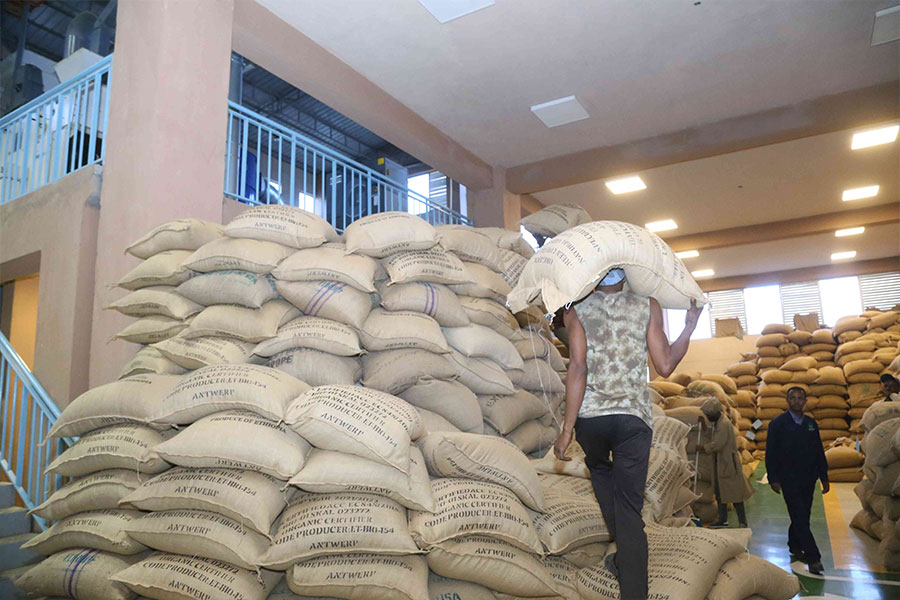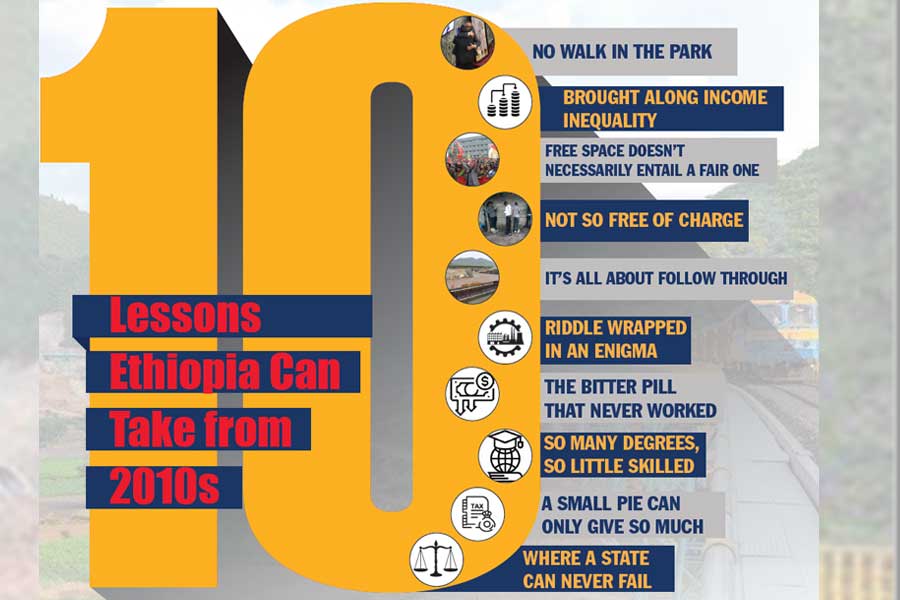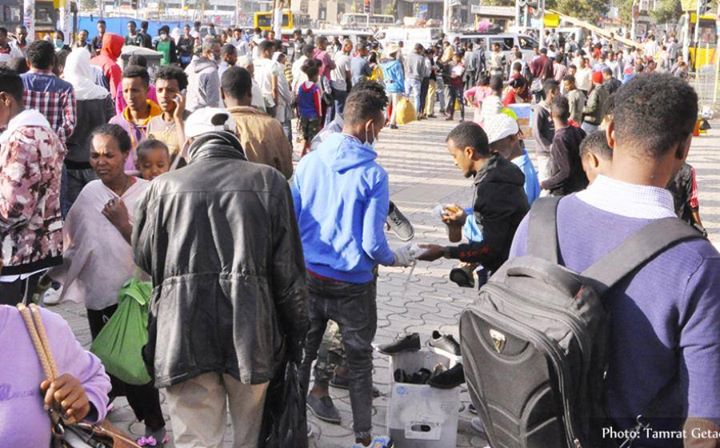
Fortune News | Feb 01,2020
For at least the last four decades, a collection of shops along Churchill Avenue has been a hub for coffins, headstones, flowers, memorial ceramic urns and burial vaults. But as of two weeks ago, the place has been noticeably different.
The area located in front of the Churchill Hotel used to have over 15 casket shops. But the number was reduced by half after the shops were demolished last year to clear the area for road construction that is part of the Beautifying Sheger project.
Even with the reduced number of shops, those that remain are finding survival difficult. Negash Degefu Funeral Service is one of the businesses that remains in the area in spite of the unfavourable conditions.
Established over four decades ago, Negash Degefu Funeral Service operates three branches across the city. Along with its first branch at Churchill Avenue, it runs branches at Salitemehert, near CMC, and Petros We Paul's, near Wingate. The store sells caskets for 1,000 to 50,000 Br depending on the types of materials the caskets are made of.
The 80-year-old Negash, who founded the business, retired three years ago, and his son Demise is currently running it. On top of his family, the father of three supports his uncles and relatives from the revenue he generates from the three stores.
Business has been good since he took over the shops from his father, but over the past couple of months the number of customers flowing to his shop has fallen sharply, according to Demise.
"Business became slower this year after Novel Coronavirus (COVID-19) was reported in the country," Demise said.
Many expected that the business of casket shops might see a boom after the pandemic hit the world, but that is not the case for operators in Addis Abeba.
Demise, who grew up closely following the trends of his father's business, says that the number of deaths recorded during the summer season is higher compared to the other seasons. In line with this data, the number of caskets sold during this season is higher as well.
Between March and July last year he had been selling 50 to 60 caskets a month. But the number fell sharply this year, and his monthly sales between March and June amounted to between 15 and 30 caskets.
Negash Degefu Funeral Service, one of the oldest casket shops in the city, lies in front of Churchill Hotel.
Dirshaye Gizaw, a 66-year-old man running a casket shop in Wingate for the past three years, also shares Demise's experience. Dershaye, who feeds his six kids from the income he generates from his shop, was a gravedigger at Petros We Paulos Church until he opened his shop.
For the past three years, he has been selling 20 to 40 caskets a month. He sells the caskets for 700 to 2,000 Br.
However, he was able to sell just 10, 8, 7 and 15 in March, April, June and July, respectively, much lower than the figures of the previous year.
"Business is so slow, and it's hard for me to survive," he said.
Demise thinks that the number of deaths has shrunk this year for two major reasons. Many people are taking good care of their health and washing their hands more since the pandemic, according to him. Secondly, he mentioned the decreased number of traffic accidents following travel restrictions after the state of emergency was declared.
Data obtained from the Addis Abeba Traffic Management Office shows that the number of fatalities due to traffic accidents has fallen by 12pc over the past six months compared to the same period the previous year. In the past six months, a total of 213 deaths were registered in the capital due to traffic accidents, down from the 242 deaths that occurred last year over the same period.
Over the five months between March and July, the Addis Abeba Vital Events Registration & Information Agency recorded 1,677 deaths. The figure for the same period the previous year stands far higher at 2,692.
Anteneh Kassa, director of the Vital Information & Evidence Service at the Agency, says that the number cannot truly reflect the actual figures on the ground since people do not have a habit of registering deaths and births.
"We try to register the figures through our own effort," he said.
Data obtained from Berhante Alem Petros We Paulos Church, one of the largest burial places in the capital with 35,000Sqm of land and hosting an average of four funerals a day, proves this point. The place is used as a burial ground for three districts Kolfe Kerano, Addis Ketema and Gullele.
Over the past six months of this year, the cemetery recorded 113 burials, a significant decline from the 141 burials that were recorded during the same period the previous year.
Gravediggers at Gullele District's Catholic-Protestant Cemetery, where foreigners and Ethiopian Protestants and Catholics are buried, confirmed this.
Tewodros Fekadu, who has been the administrator of DTA, an association that has carried out the burials at the Cemetery for the past four years, says that the number of requests for burials fell after the pandemic was reported in the country. From March to July of the 2018/19 fiscal year, 20 to 35 funerals were recorded a month. The number has fallen to 10 to 15 this fiscal year.
"Sometimes we may not bury one person in a week," said Tewodros.
Religious cemeteries are seeing similar trends, as is the graveyard operated by the City Administration. Bayetwar Zelaki Marfiya Cemetery of the Municipality, which gives burials to unidentified people, is one of them. The bodies are brought by city police from Alert, Menelik, St. Paul’s and Black Lion hospitals.
Tariku Gelaw, a gravedigger in the cemetery since 2015, says he has been digging 15 graves a week, but the number has recently been halved. Over the past six months, the cemetery hosted a total of 578 funerals - a sharp decline from the 856 burials of the previous year.
Bilal Shikur (MD), lead of the Addis Abeba Mortality Surveillance Programme, agrees on the basic fact that the death rate is showing a decline over the past couple of years.
Launched in 2001 with the support of the Centre for Disease Control & Prevention, the Programme aims at detecting deaths brought on by the global epidemic of HIV/AIDS. After medication for HIV became available, it continued to serve as a tool to assess its effects. Currently, the Programme collects data from 33 cemetery sites in the city and documents the number of deaths along with their causes, according to Bilal.
“Obtaining accurate data is a challenge in this country,” said Bilal. “We don’t have a strong database of births and deaths in the country.”
The Programme has been closely following the number of deaths since March when the first reported case of the Novel Coronavirus (COVID-19) was first detected in the country. It is primarily using three main methods - recording the number of deaths is the first element of the study, while collecting a verbal autopsy follows.
Days after the death of an individual, the Programme officers approach family members to inquire and record the cause of death, according to Bilal.
The third and last element involves assessing the probability of whether or not the individual passed away due to COVID-19.
“We are doing this using new software developed by the World Health Organisation,” he said. “This rapid assessment tool is not 100pc accurate, but it will show us the likelihood of the cause.”
The data needs to be carefully reviewed, according to Bilal.
“The number of deaths in the city has shown a decreasing trend in the past few years attributable to various interventions by health institutions,” he said. “What we need to look at is if it's still decreasing at the same rate as before.”
The data until the end of May shows nothing out of the ordinary.
But with the onset of the pandemic in mid-March, this is not surprising, said Bilal, who believes the results of June and July would be more indicative.
Alemayehu Worku (PhD), an advisor for Addis Abeba University's School of Public Health, College of Health Science, argues the opposite, saying that the number of deaths this year shows an increase after health centres closed their doors to focus on COVID-19.
Alemayehu says that the mortality rate seems to have declined due to population growth.
"People are sensitive when it comes to some issues, and death is one of them," said Alemayehu. "They want to hear that the death rate is falling. But before reaching such a conclusion, a scientific survey is required."
PUBLISHED ON
Aug 29,2020 [ VOL
21 , NO
1061]

Fortune News | Feb 01,2020


Fortune News | Jan 13,2024

Fortune News | Aug 26,2023

Fortune News | Jan 13,2020

Fortune News | Jan 05,2020

Radar | Jul 13,2019

Covid-19 | Apr 03,2020

Radar | Apr 22,2022

Radar | Dec 04,2022

Dec 22 , 2024 . By TIZITA SHEWAFERAW
Charged with transforming colossal state-owned enterprises into modern and competitiv...

Aug 18 , 2024 . By AKSAH ITALO
Although predictable Yonas Zerihun's job in the ride-hailing service is not immune to...

Jul 28 , 2024 . By TIZITA SHEWAFERAW
Unhabitual, perhaps too many, Samuel Gebreyohannes, 38, used to occasionally enjoy a couple of beers at breakfast. However, he recently swit...

Jul 13 , 2024 . By AKSAH ITALO
Investors who rely on tractors, trucks, and field vehicles for commuting, transporting commodities, and f...

Oct 18 , 2025
The political establishment, notably the ruling party and its top brass, has become p...

Oct 11 , 2025
Ladislas Farago, a roving Associated Press (AP) correspondent, arrived in Ethiopia in...

Oct 4 , 2025
Eyob Tekalegn (PhD) had been in the Governor's chair for only weeks when, on Septembe...

Sep 27 , 2025
Four years into an experiment with “shock therapy” in education, the national moo...